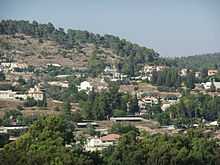Eshtaol
| Eshtaol | |
|---|---|
 | |
 Eshtaol | |
| Coordinates: 31°46′51.95″N 35°0′36.36″E / 31.7810972°N 35.0101000°ECoordinates: 31°46′51.95″N 35°0′36.36″E / 31.7810972°N 35.0101000°E | |
| Council | Mateh Yehuda |
| Region | Jerusalem corridor |
| Affiliation | Moshavim Movement |
| Founded | December 1949 |
| Founded by | Yemenite immigrants |
| Website | www.eshtaol.org.il |
Eshtaol (Hebrew: אֶשְׁתָּאוֹל) is a moshav in central Israel. Located north of Beit Shemesh, it falls under the jurisdiction of Mateh Yehuda Regional Council. In 2011, Eshtaol had a population of 1087.
History
Eshtaol was in the territory allotted to the tribe of Dan (Joshua 19:41). According to the Bible, Samson began to prophesy "between Zorah and Eshtaol" (Judges 13:25). After his death in Gaza, Samson's body was brought back for burial in his father’s tomb between Eshtaol and Zorah (Judges 16:31). Five scouts from Eshtaol and Zorah were sent out to find a land suitable for the tribe of Dan. (Judges 18:1-29). [1]
Modern Eshtaol was founded on the lands of two depopulated Palestinian Arab villages, Ishwa' and Islin[2] after the 1948 Arab-Israeli War. It was part of a plan to establish settlements in the Jerusalem Corridor in order to create a contiguous bloc between the coastal plain and Jerusalem. The first residents were Jewish immigrants from Yemen, who settled there in December 1949. They worked in land reclamation and forestry. The Jewish National Fund established a 45-dunam nursery in Eshtaol to supply saplings for JNF forests. Later, the moshav branched out into poultry and other agricultural enterprises. At the end of the 1990s, the moshav absorbed 100 new families.
Archaeology
In 2013, archaeological excavations conducted by the Israel Antiquities Authority in Eshtaol discovered the oldest structure ever found in the Shfela region of the Judean Hills, dating back to the first permanent human settlement in the area some 10,000 years ago.[3]
See also
References
External links
- Moshav website (Hebrew)
| ||||||||||||||||||||